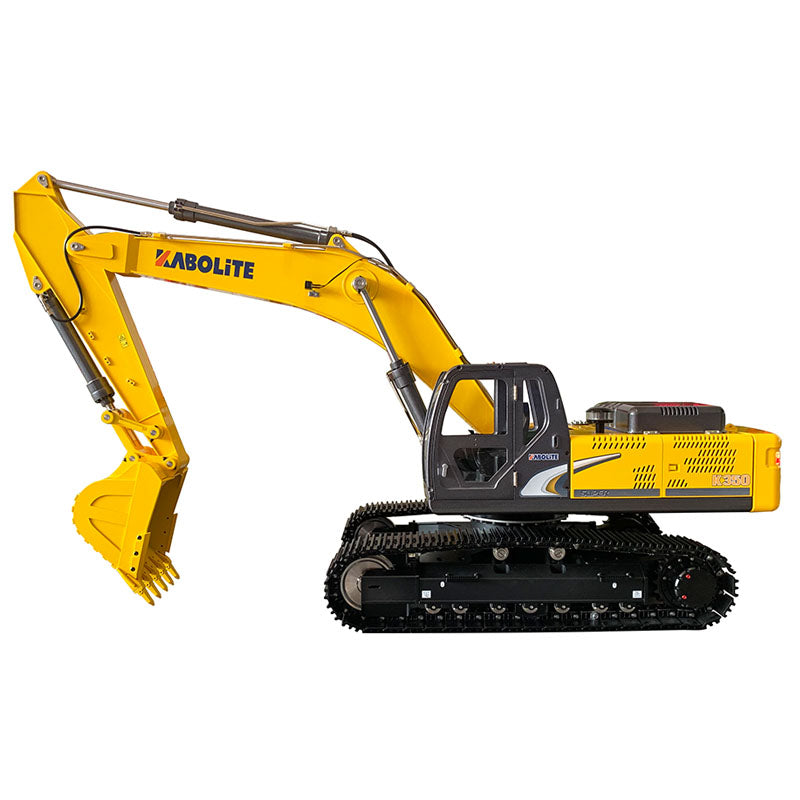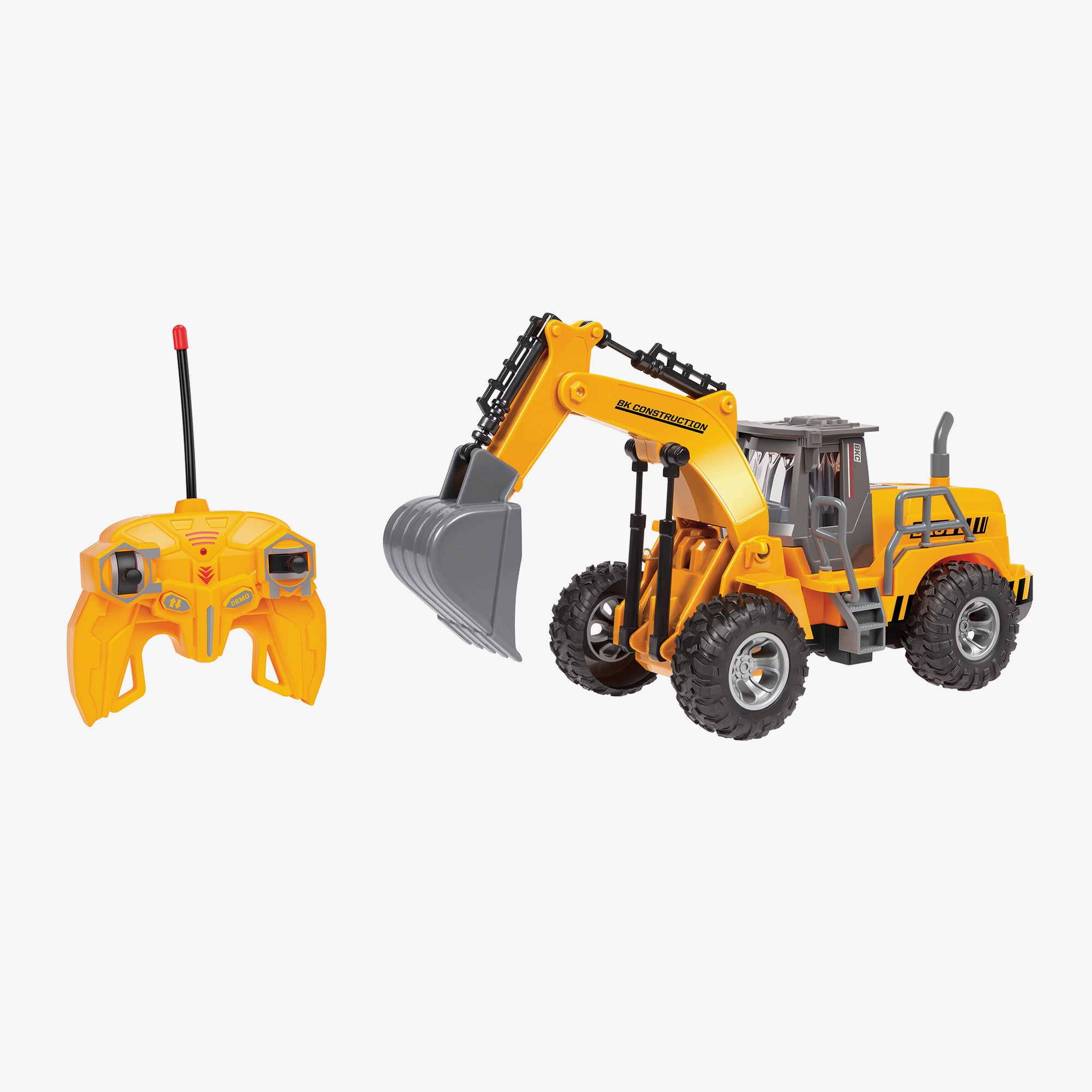How to Maintain Your rc excavator for Longevity and Optimal Performance
Comprehending How Excavator Works and Its Effect On Efficiency
Excavators play an important function in construction and mining procedures, relying upon a complicated interaction of hydraulic and mechanical systems. Their ability to do a selection of jobs depends upon both their layout and the technology incorporated within. Comprehending these components can greatly impact operational performance and efficiency. As advancements remain to reshape the sector, one must consider exactly how these changes will certainly influence future techniques and performance.
The Fundamentals of Excavator Mechanics

The Duty of Hydraulic Systems in Excavators
At the heart of excavator operation exists the hydraulic system, which plays a crucial duty in powering the device's motions and functions. This system utilizes pressurized hydraulic fluid to transfer power, making it possible for various activities such as digging, lifting, and swinging. By harnessing the principles of hydraulics, excavators can do tasks with amazing accuracy and pressure, improving overall operational efficiency.The hydraulic system contains key components, including cyndrical tubes, shutoffs, and pumps, which interact to manage the flow and direction of the liquid. When the driver involves the controls, the hydraulic fluid is guided to particular cylinders, converting the operator's commands into physical movement. This mechanism allows for smooth and responsive activities, which are essential in construction and excavation environments. double e volvo rc excavator. The effectiveness of the hydraulic system directly impacts the performance and convenience of the excavator, making it an indispensable element in modern-day excavation procedures
Secret Components of an Excavator
Comprehending the essential parts of an excavator is necessary for understanding just how this effective device runs. An excavator includes numerous considerable components, including the undercarriage, residence, pail, arm, and boom. The undercarriage provides stability and flexibility, commonly featuring wheels or tracks to browse different surfaces. The residence consists of the engine and hydraulic systems, allowing the driver to manage movement and power the equipment. The boom prolongs from your house, allowing upright reach, while the arm links to the bucket, promoting digging and training operations.Additionally, the cab houses the driver, outfitted with controls for accurate handling. Each of these components plays an important function in the excavator's general capability, contributing to its efficiency and efficiency on building and construction sites. Comprehending these components aids in maintaining and enhancing excavator efficiency, making certain tasks are finished securely and properly.
Add-on Versatility and Its Advantages
Add-on versatility is a vital element of excavators, enabling operators to switch in between numerous tools tailored for certain jobs. This versatility not only boosts work performance but likewise adds to cost-effectiveness by reducing the need for multiple machines. Recognizing the different types of add-ons readily available can significantly affect the general efficiency and capability of an excavator on work websites.
Kinds of Attachments
While excavators are primarily recognized for their digging abilities, their true flexibility depends on the vast array of attachments offered. These accessories improve the excavator's performance, enabling it to do different tasks beyond excavation. Common attachments consist of containers (for excavating and scooping), hydraulic thumbs (for realizing products), and augers (for piercing holes) Grapples are made use of for moving and taking care of particles, while rippers can break up tough surface areas. Other specialized add-ons, such as trenchers and rakes, make it possible for excavators to adapt to specific work demands. This variety not only increases the maker's utility throughout different fields, including landscape design, building and construction, and demolition, but additionally enables drivers to customize their equipment to satisfy certain project needs successfully.
Boosted Job Effectiveness
Maximizing job effectiveness is a key benefit of using different excavator accessories. Different accessories permit an excavator to execute multiple tasks without requiring to switch equipment, saving important time and labor. For example, utilizing a hydraulic hammer can damage concrete while a pail attachment can excavate dirt, enabling a smooth operations. This adaptability lowers downtime associated with devices changes and enhances performance on-site. Furthermore, specialized accessories boost precision in tasks such as grading or landscaping, causing greater high quality end results. The ability to adapt to various task demands not only simplifies operations however additionally minimizes the demand for added machinery, ensuring that projects are finished swiftly and properly. In general, attachment versatility significantly adds to increased task effectiveness in excavation work.
Cost-Effectiveness and Versatility
Cost-effectiveness is a significant benefit of utilizing versatile excavator add-ons. These add-ons allow a single excavator to perform multiple jobs, lowering the need for added equipment and labor - double e volvo rc excavator. By changing in between buckets, hammers, and grapples, operators can take on different tasks, from excavating to demolition, thereby making best use of devices usage. This adaptability not just reduces operational costs yet additionally decreases downtime related to transforming tools. Additionally, the capacity to customize excavators with specialized attachments boosts efficiency, as they can successfully deal with varied tasks according to job needs. To end, the combination of cost-effectiveness and versatility in excavator add-ons adds to enhanced operational effectiveness and resource appropriation in building and construction and excavation projects

Advanced Innovation in Modern Excavators
Modern excavators are progressively equipped with innovative modern technology that transforms excavation procedures. Automation important link enhances operations, while enhanced gas effectiveness decreases operational prices. In addition, wise control systems enhance precision and safety and security, noting a substantial advancement in excavation equipment.
Automation in Excavation Processes
As excavation modern technology develops, automation has actually become a critical element in boosting effectiveness and accuracy on task websites. Modern excavators are furnished with advanced automated systems that assist in tasks such as grading, digging, and trenching with marginal driver intervention. These systems make use of sensors, GPS, and artificial intelligence formulas to guarantee precise positioning and depth control, greatly lowering the margin for error. In addition, automation enables operators to concentrate on strategic decision-making as opposed to hands-on controls, leading to boosted performance generally. Such technologies not only enhance operations however also improve safety and security by minimizing human error in complex procedures. Consequently, the combination of automation in excavation procedures stands for a significant improvement in building and construction technology, driving the industry towards higher efficiency and efficiency.
Enhanced Fuel Effectiveness
Improvements in technology have actually additionally led to significant improvements in fuel efficiency for contemporary excavators. Modern machines are furnished with advanced engines that enhance power result while reducing fuel consumption. These engines utilize innovative burning modern technologies, such as turbocharging and straight fuel shot, to improve efficiency and performance. Furthermore, lightweight materials in building and construction minimize general weight, permitting much less power expense during operation. The intro of variable rate controls makes it possible for operators to adjust engine efficiency according to specific jobs, better lessening fuel use. Consequently, these improvements not only reduced operational costs yet likewise add to environmental sustainability by reducing exhausts. In general, enhanced gas efficiency in excavators is an important development that bolsters efficiency and economic feasibility in the building sector.
Smart Control Solution
While drivers navigate significantly intricate job websites, smart control systems in excavators have actually emerged as crucial tools for boosting efficiency and accuracy. These advanced modern technologies use formulas and sensing units to keep track of numerous parameters such as tons weight, terrain problems, and operational performance. By instantly adjusting hydraulic functions, clever systems optimize device efficiency, causing boosted productivity and minimized wear on elements. my review here In addition, operators profit from intuitive interfaces that offer real-time comments and diagnostics, enabling informed decision-making. This combination of innovation not just simplifies operations however also lessens human mistake, adding to safer work settings. As the building and construction industry remains to progress, wise control systems will play an important function fit the future of excavator efficiency and performance.
Enhancing Functional Performance With Excavators
Excavators play a crucial role in enhancing operational efficiency throughout numerous construction and excavation jobs. Their convenience permits for numerous tasks, including digging, material, and lifting handling, which simplifies workflows and lowers the demand for additional devices. With effective hydraulic systems, excavators can carry out sturdy tasks with precision, significantly reducing the time required Get More Information to complete tasks. The combination of sophisticated modern technology, such as general practitioner and automated controls, additionally optimizes their procedure, allowing operators to achieve better precision and lower material waste. Furthermore, modern excavators are made to take in less gas and lessen emissions, adding to both expense savings and environmental sustainability. By making use of excavators properly, building teams can improve productivity, fulfill job deadlines, and boost total website management. This multifunctionality and performance make excavators vital tools in the modern-day building landscape.
The Future of Excavators in Construction and Mining Industries
As the building and mining industries evolve, the future of excavators is positioned for significant change driven by technical development and transforming operational demands. Advances in automation and expert system are improving excavator capabilities, enabling enhanced precision and performance in procedures. Autonomous excavators are arising, lowering the requirement for human treatment and reducing the danger of accidents.Moreover, the integration of telematics and IoT innovation makes it possible for real-time monitoring of device efficiency and anticipating maintenance, maximizing uptime. Environment-friendly designs, including electric and hybrid versions, are acquiring grip, aligning with sustainability goals within the industry.Additionally, using sophisticated products and lighter layouts boosts fuel efficiency while preserving efficiency requirements. As these fads progress, excavators will play an essential role in meeting the enhancing needs for efficiency and safety and security in building and construction and mining, ultimately changing functional landscapes.
Frequently Asked Questions
Just How Do Climate Problems Influence Excavator Performance?

Weather conditions substantially affect excavator performance, as rain and mud can prevent grip and stability, while extreme temperatures may affect hydraulic systems. Operators should adapt to these variables to assure suitable performance and safety throughout procedures.
What Safety Measures Should Operators Comply With While Utilizing Excavators?
Security measures for excavator drivers include using appropriate individual protective equipment, performing pre-operation evaluations, ensuring proper interaction with ground employees, keeping a safe range from overhead hazards, and adhering to well-known functional procedures to avoid crashes.
Exactly How Often Should Excavators Be Preserved for Optimum Performance?
Excavators need to be kept on a regular basis to ensure peak efficiency, generally every 250 operating hours or as defined by the manufacturer. Routine checks boost reliability, avoid unanticipated breakdowns, and extend the life expectancy of the devices.
What Is the Ordinary Life-span of an Excavator?
The average lifespan of an excavator usually varies from 10,000 to 15,000 hours of procedure. Variables influencing longevity include maintenance methods, operating conditions, and the high quality of the maker itself, affecting general performance and effectiveness.

Can Excavators Run on Uneven Terrain Properly?
Excavators can operate efficiently on unequal surface as a result of their articulated designs and adjustable tracks. These functions enable them to preserve security and grip, enabling efficient operation in difficult atmospheres frequently come across in building and construction and landscape design tasks. Each of these parts plays a vital role in the excavator's overall capability, contributing to its efficiency and efficiency on building sites. Optimizing work effectiveness is a main advantage of using various excavator attachments. While drivers navigate significantly complex work websites, wise control systems in excavators have arised as essential tools for boosting effectiveness and precision. Excavators play an important duty in enhancing operational effectiveness throughout different building and excavation jobs. Developments in automation and man-made knowledge are improving excavator capacities, enabling for enhanced accuracy and effectiveness in operations.